What You Put Into Life is what You Get Out of It.
The Magnitude of Clint Eastwood’s “Unforgiven”
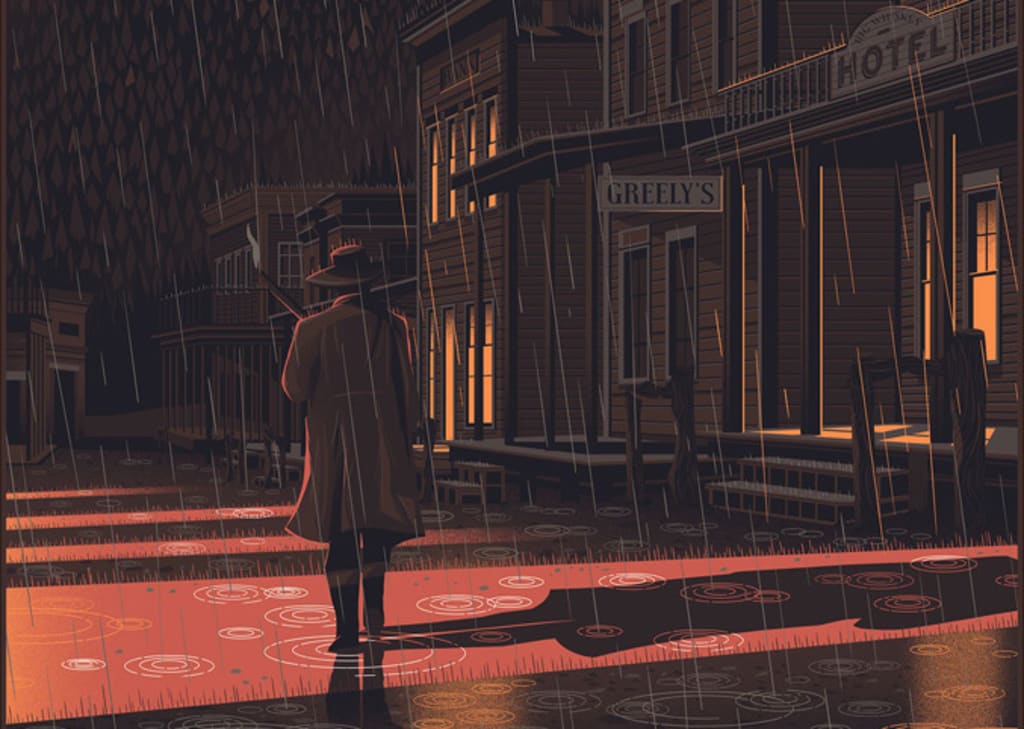
In 1992, director and film star Clint Eastwood released a film that he announced would be the final western he would ever direct or act in. A film simply titled, Unforgiven. Upon it’s release, the film was heralded as a cinematic masterpiece; winning a total of four Academy Awards, and two Golden Globes. Nearly 30 years later, the film is still ranked as one of the best western films ever made. Yet, what is it that makes this film successful and what elements make the movie one of Clint Eastwood’s best works and performances?
The plot surrounds an aging gunfighter named William Munny (played by Eastwood), who attempts to abandon his past life as a criminal, by becoming a hog farmer in Kansas. Though, when he befriends a young bounty hunter nicknamed “The Schofield Kid” (played by Jaimz Woolvett) and hears news of a teenage prostitute being violently assaulted and disfigured by two cattlemen in Wyoming, as well as a $1,000 bounty being placed on their heads. William Munny hesitantly brandishes his old guns once more in order to offer his children a better life; riding to Wyoming with the bounty hunter as well as Munny's old partner in crime, Ned Logan (played by Morgan Freeman). Furthermore, they must confront the wanted men who are also being persued by another competing gunfighter named “English” Bob (played by Richard Harris) as well as a posse of corrupted lawmen, commanded by Sheriff William "Little Bill" Daggett (played by Gene Hackman).
At the time of the film’s release, Dances With Wolves starring Kevin Costner, had redefined the entire western film genre to a new audience of moviegoers. Adding life and depth to not only the protagonist(s), but also the antagonist(s) and the supporting cast. Clint Eastwood took such a style of filmmaking and storytelling, and brought it to a new level. Making the setting of “Unforgiven” a frontier that was much darker and more realistic. Along with abandoning the cliches of his previous works like Hang Em High, Pale Rider, and The Outlaw Josey Wales. Rather than relying on gratuitous gun violence to entertain audiences, Eastwood uses the themes of fear, regret, vengeance, and tainted justice which become personally attached to the viewer. This allows the viewer to find character relations between him/herself and the characters they see on the screen. Characters such William Munny, Ned Logan, “English” Bob, and “The Schofield Kid” reveal the humanism behind the archetypes they would represent in previous westerns. For Eastwood’s performance as William Munny drastically differs from his previous career-defining western performances (such as The Man with No Name, U.S. Marshal Jed Cooper, or Josey Wales), primarily due to Eastwood's physical age. Being 54 years old at the time of shooting the film, he reveals his character as a man who desires to move on from his life of crime and alcoholism. Yet, when enticed by the offer to give his children a better life, than as poverty stricken hog farmers, he confronts his past life full force; at the business end of a firearm. Along with Eastwood, the casting of Morgan Freeman as Ned Logan, is a powerful performance despite his condensed screen time. The character is performed in a notion as if he wants nothing to do with William Munny’s plan. He's been long content and enjoys the quiet life as a Kansas farmer, but since he’s good with a rifle, he is pulled into Munny’s metaphorical “crusade”. A crusade which which ultimately costs him his life; being unjustly arrested by the sheriff's posse, tortured to death by Little Bill Daggett, and having his body put on display, as a means of warding off others who are hooked by the reward money.
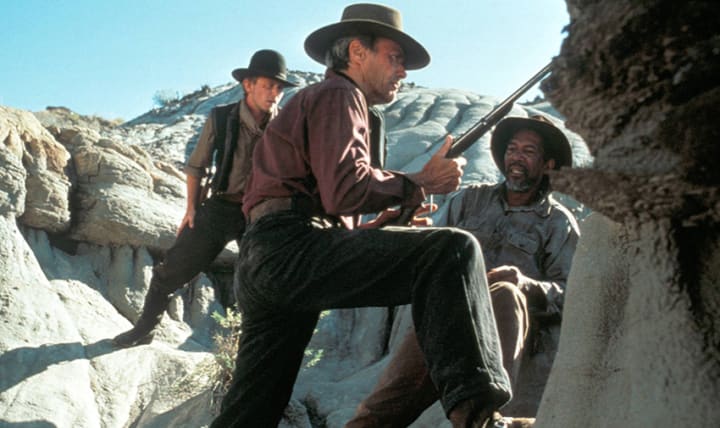
The same thing occurs with Jaimz Woolvett’s character, “The Schofield Kid”. He represents the younger generations and the callowness that often follows such generations. The character offers the opportunity to kill the Wyoming cowboys, as a means of finding adventure, which is what most young men often did at that time. Only to have his eyes rudely awakened to an environment which overwhelms him; and by the time he kills one of the cowboys, he confesses that not only was he unarmed, but that this was the first man he had ever killed.
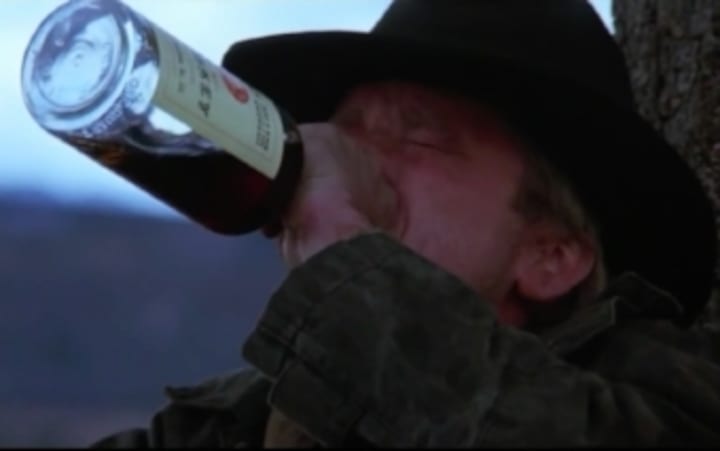
Alongside Woolvett's character, “English” Bob exposes the life of those who try to live off of a legend of their own making. Making a well off name for himself (thanks to his dubious biography The Duke of Death), only to be humiliated and beaten by Sheriff Daggett; showing how he is, in actuality, a man of fear and cowardice who uses his mouth as a means of reinforcing his superficiality. Along with such an achilles heel is his public expression of social and political views. Such as how the United States should be lead by a king or queen, in order to eliminate the event of “Presidential Assassinations”. Which does nothing but offend everyone that he talks to.
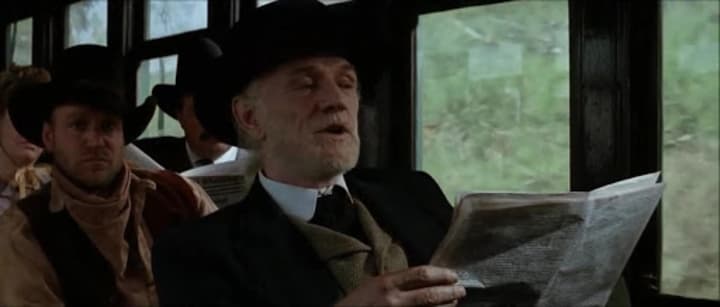
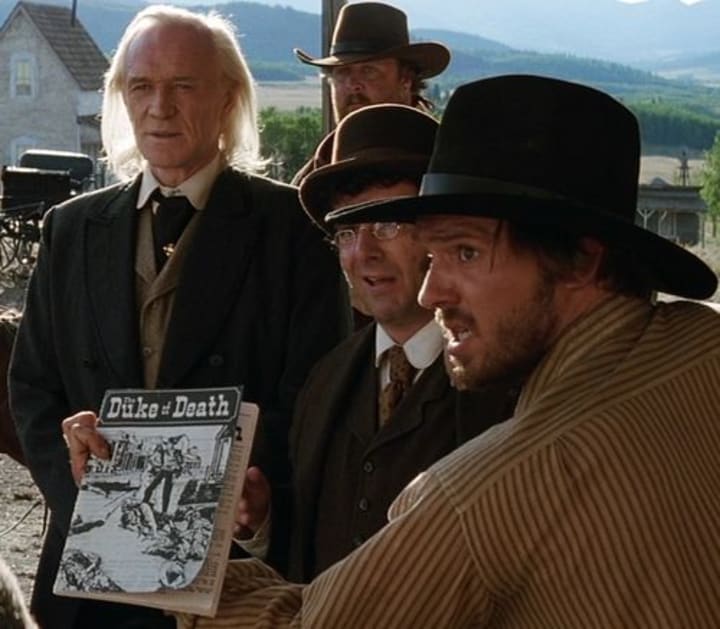
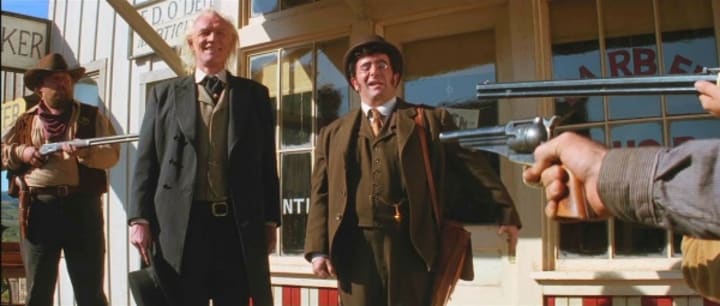
The main antagonist being Sheriff “Little Bill” Daggett, offers a shocking insight on the nature of law enforcement in the old west. When in most places, the law was just as vitiated as the outlaws. Turning a blind eye towards the slashing of an innocent teenage prostitute, and offering to hide the perpetrators of the crime, from the assassins and gunmen wanting the $1,000 bounty on their heads. Such a performance by Gene Hackman, defies the entire archetype of the “Town Taming Lawman”; established in earlier films like High Noon, Gunfight at the O.K. Corral, and Support Your Local Sheriff. Opting instead to create a character that resembles the real life lawman turned outlaw Henry Plummer and his gang of deputies named “The Innocents”. Which exposes how the badge of law enforcement was abused in the past, as much as it is abused currently. Furthermore, Sheriff Daggett's actions only comes back to bite him like a rattlesnake. Following his capture, and torturing to death of Ned Logan, William Munny rides back into town to face off against him and his deputies while they drink to their "victory" in a saloon and proceeds to play the Reaper; giving Daggett and his goons their rightful fate they deserve for their abuse of power and ignorance to justice; the final act of William Munny's career as a gunman and the final shootout in Eastwood's career where he and he alone stands tall against overwhelming odds.
Such redefinitions of the western film genre, is what makes Unforgiven, in numerous ways, Clint Eastwood’s magnum opus.
About the Creator
Jacob Herr
Born & raised in the American heartland, Jacob Herr graduated from Butler University with a dual degree in theatre & history. He is a rough, tumble, and humble artist, known to write about a little bit of everything.


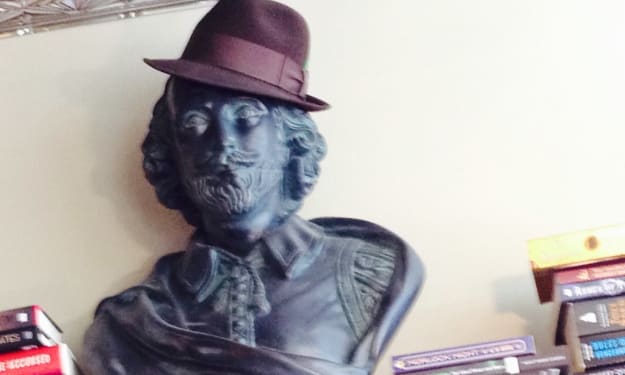



Comments
There are no comments for this story
Be the first to respond and start the conversation.